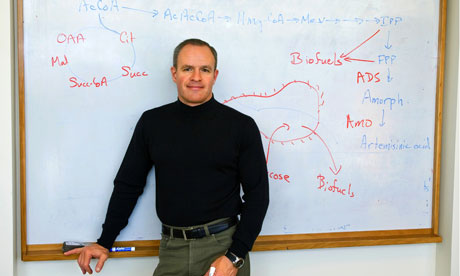Aside from new uses in supplying phosphor and nitrogen for truly sustainable farming, one farming input which can't be solved with microbes is fuel. Whether we like it or not, bacteria can't just eat sugars and secrete petroleum products into the tractors, combines and delivery trucks to supply us truly sustainable foods - or can they?
it seems they might just be able to.
for some time, research has been ongoing into the possibility of pressing oils from algae
but now bio-engineers in the USA are taking the idea of living foundries further - by engineering e-coli to excrete diesel directly. A guardian interview asked Jay Keasling, a professor of bioengineering at the University of California, Berkeley and CEO of the US Department of Energy's Joint BioEnergy Institute (JBEI) about his previous successes manufacturing anti-malaria drugs using "living foundries" before asking him about his new biodiesel bugs:
How easy is it to make fuel from microbes?
About a year ago, we published a paper in Nature where we engineered E. coli to produce a diesel fuel. The beauty of it was that the E. coli took in the sugar, transformed it directly into diesel, and the diesel was secreted outside the cell. Because it's oily, the diesel floats to the top. So unlike ethanol, which you have to distil to get it pure enough to use in an engine, the diesel purifies itself. That reduces the cost and the amount of energy needed to make it.
Will your diesel be as good as the fuel at the pump?
It's as good, if not better. Fuel is incredibly complicated – it has many different components and it's optimised for different things. We can build the fuel from the most valuable molecules, so we don't have the unwanted components that existing fuels have. You get better gas mileage out of it and cleaner emissions. And we're talking about a substantial improvement for the environment. Our diesel reduces greenhouse gas emissions by 80%, which is pretty substantial.
The world uses around 90 million barrels of oil a day. How can bugs compete?
We're looking at replacing 30% of transportation fuel in, say, a 20- to 30-year period. That is a huge undertaking. We are going to develop the technology to make the fuels and license them out. In the next 10 to 20 years, we'll see a very diverse range of companies all working with different techniques to make fuels.
How will your work affect the giant oil companies?
The energy business is the biggest sector in the world, and the beauty about working in the biggest industry on the planet is that there is room for everybody. Exxon is the largest company in the US, but it has only 5% of the transportation fuel market. That alone tells you that anybody can play.
Will synthetic biology be used to make more than fuels?
As well as fuels, we are looking at everything else we produce from petroleum, including polymers and plastics, and asking: can we go in and replace those? I don't see any reason why we can't make almost any chemical we want from sugar, a renewable resource. It's a great time to be in biology and biotechnology, because we have so many more tools and it's so much more powerful than it used to be.

Jay Keasling believes he can create alternatives to diesel and jet fuel using synthetic biology.
Photograph: Roy Kaltschmidt/Lawrence Berkeley Nat'l Lab
Photograph: Roy Kaltschmidt/Lawrence Berkeley Nat'l Lab
a future-facing convention regarding living foundries is to be held soon.
in the mean-time, we wait with baited breath at what other uses bugs will be put to, in terms of the immense environmental service they can provide.
No comments:
Post a Comment